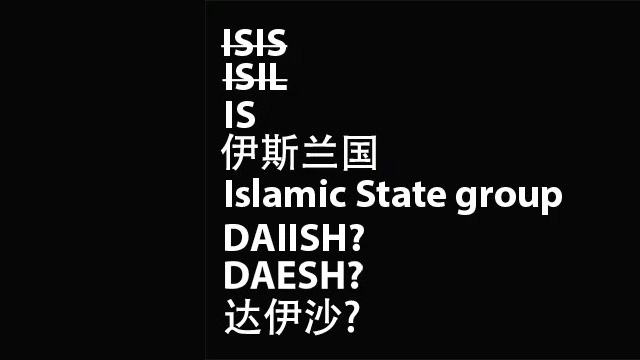A growing number of world leaders are now referring to the Islamic State as “Daesh.” Find out what it means, why they’re using it, and why some people — including many news organizations — will still refer to them as Islamic State.
What is “Daesh”?
Like ISIS or ISIL, Daesh is the acronym for the Islamic State’s self-proclaimed name: Islamic State in Iraq and Syria/the Levant.
In Arabic it’s:
لدولة الإسلامية في العراق والشام’
Anglicized, the Arabic is:
al-Dowla al-Islaamiyya fii-il-I’raaq wa-ash-SHaam,
This acronym is often translated as Daiish or Daesh.
Why are people using “Daesh”?
Arabic translator Alice Guthrie said the Islamic State objects to this acronym: “Because they hear it, quite rightly, as a challenge to their legitimacy: a dismissal of their aspirations to define Islamic practice, to be ‘a state for all Muslims’ and, crucially, as a refusal to acknowledge and address them as such.”
“They want to be addressed as exactly what they claim to be, by people so in awe of them that they use the pompous, long and delusional name created by the group, not some funny-sounding made-up word,” she said in: “Decoding Daesh: Why is the new name for ISIS so hard to understand?” — a blog, written for the London-based Free Word Centre.
Additionally there’s a one-letter difference between Daesh and داعس or daes, which means “someone or something that crushes or tramples,” Guthrie wrote. Otherwise, the similarity stops there. Contrary to some media reports, the two words are unrelated, Guthrie said.
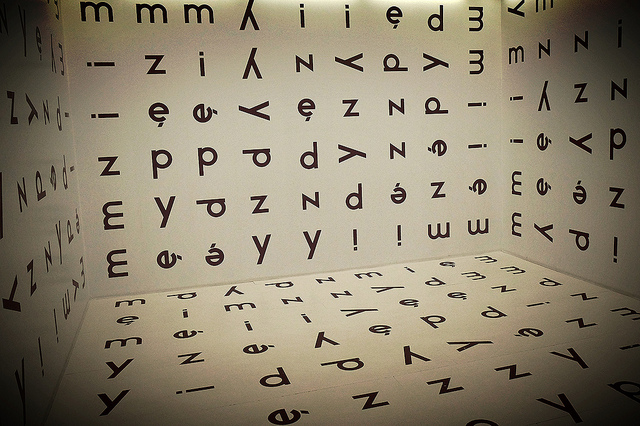
Photo on Flickr by jurek d.
ISIL reportedly hates the acronym so much that it “threatened to cut out the tongues of anyone it hears using the term,” NBC reported.
And that’s also why many world leaders use Daesh, as a way to deny the Islamic State group’s self-proclaimed authority, Guthrie said.
“This word is part of a multi-pronged, diverse range of efforts by Arabs and Muslims to reject the terrorists’ linguistic posturing, their pseudo-classical use of Arabic, their claims to Quranic authority and an absolute foundation in sacred scripture, as reflected in their pompous name,” Guthrie wrote.
As an acronym, Daesh is accurate, writes Zeba Khan in a Boston Globe Op-Ed. But used as a “play on words” she said it can be “an insult.”
“Why do they care so much? The same reason the United States should. Language matters,” Khan wrote.
Why does the media still use “Islamic State group”?
Some world leaders have asked journalists also use “Daesh” in all their coverage. French Foreign Minister Laurent Fabius told journalists: “I do not recommend using the term Islamic State because it blurs the lines between Islam, Muslims and Islamists.
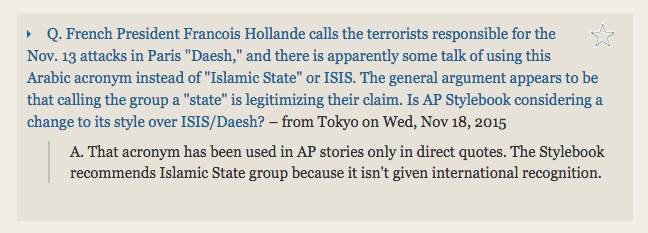
Despite this, the Associated Press said in its Stylebook that the acronym Daesh is only used in AP stories in direct quotes. AP recommends using “Islamic State group,” instead, “because it isn’t given international recognition.”
In a Sept. 2014 blogpost, AP Standards Editor explained:“The AP now uses phrases like ‘Islamic State group’ or ‘fighters from the Islamic State group’ to avoid phrasing that sounds like they could be fighting for an internationally recognized state.
The news agency Agence France-Presse also uses “Islamic State group” as well as “IS jihadists”, writes AFP’s Global News Director Michele Leridon in a blog post.
“The Arabic acronym for the group’s full original name, Daesh, while used by some governments including France, is hard for most readers to relate to. An international news agency cannot be pressured into using subjective terms like “terrorists” or “slayers”. Nor can we alter the name an organisation has chosen for itself,” Leridon wrote.
“But we feel giving its name simply as “Islamic State” is inappropriate for two reasons. Firstly this is not a state, with borders and international recognition. Secondly, a great many Muslims consider the values driving this organisation to have nothing to do with Islam. The name “Islamic State” is therefore doubly likely to mislead the public.”
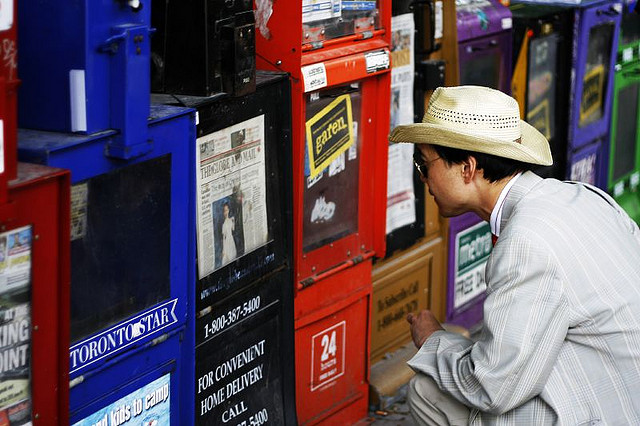
Photo on Flickr by Christopher Woo.
Kelly McBride, vice president of academic programs a The Poynter Institute, a journalism education organization, said if journalists choose to use “Daesh”, the term and its meaning must be explained.
“For American audiences it doesn’t mean anything unless we tell them what it means. For Arabic audiences, the word has evolved to communicate a tyrannical power that kills things,” McBride told CCTV America in an email.
“Those in favor of using Daesh want to communicate to Muslims that ISIS is a bastardization of Islam. But hardly any journalism organizations are communicating only to Muslims. So the question isn’t really whether to use Daesh, but how to introduce it and how to communicate to a broad audience with words that are universally understood.”
Is there a Chinese word for “Daesh” and is it used?
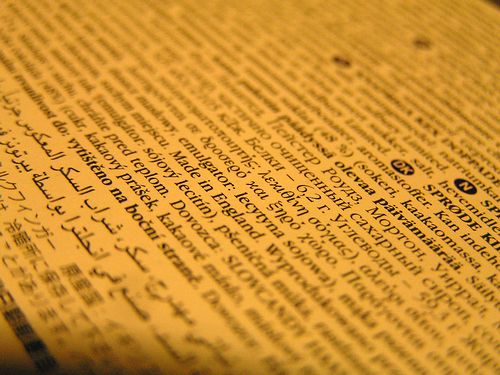
Photo on Flickr by nofrills.
The Chinese government and media mainly use 伊斯兰国 (Yisilan guo) in speeches and reports, which translated literally means: “Islam State.” When a world leader uses “Daesh” Chinese media translates that acronym as 达伊沙 (Da yi sha), the phonetic pronunciation of Daesh in Chinese. When reporting in English, some Chinese media have used the term: “Islamic State (IS) or Daesh groups.”
In an interview with China’s popular news site, The Paper, academic Li Weijian from the Shanghai Institute of International Studies Foreign Policy Studies suggested that Chinese media reporting in the Chinese language should use the English acronym of “IS” to refer to the group. This would make it harder for Chinese audiences to associate with the term with “伊斯兰国” (Yisilan guo/”Islam State”), and won’t cause resentment from domestic Muslim communities, he argued.
Reflecting similar debates around the world, at least one Chinese blogger has suggested that officials and the journalists should use “Daesh” instead.
In Douban and Weibo blog posts, Shanghai-based French translator He Jiawei argued that Islamic State should be called 达阿希 (Daa Xi)—a different Chinese phonic translation of “Daesh” in Chinese.
Using terminology that makes this group sound as though it’s an Islamic authority, whether it’s “Islamic State”, “IS”, or “伊斯兰国 (Yisilan guo)”, will lead to a public misunderstanding of Islam and Muslims he argued.
“It doesn’t matter if it’s the West, it doesn’t matter if it’s China, It doesn’t’ matter if its the media, or publications, but when it comes to concealing [misrepresenting] Islam, over time it will only cause more problems,” He wrote. “But if we have fair reporting, and publishers use the same vocabulary and context, then we can have true understanding and harmonious coexistence.”
He Jiawei has about 14,000 followers on Weibo, and his post has received 75 likes so far and has also been referenced The Paper.
 CGTN America
CGTN America
